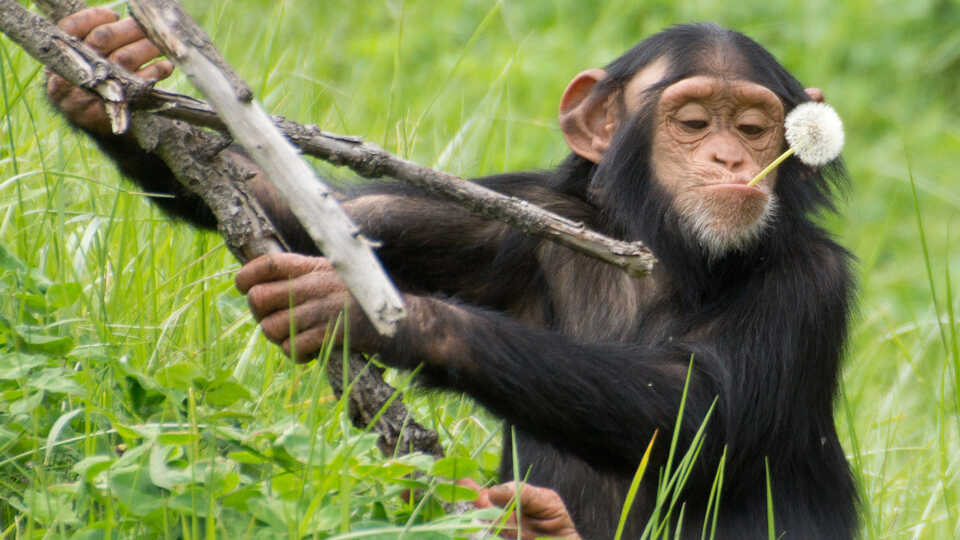Science News
Chimpanzee Chefs

Which came first—cooking or human-built fires? Most anthropologists believe that human control of fire preceded cooked food, but perhaps it was the other way around. Perhaps humans started building fires with the intention of cooking their food.
“Why would early humans be motivated to control fire?” asks Yale’s Alexandra Rosati. “I think cooking might give you a reason. We know wild chimps will observe natural fire, and they even sometimes seek out and eat cooked food left behind by it.”
With no early humans around to ask the above question, Ropati and her colleague and husband, Harvard’s Felix Warneken, decided to test the next best thing, chimpanzees (our closest relatives). Not in fire-building (yikes!), but rather these questions: if chimpanzees had the means to cook their food, would they choose to? Could they understand the process of cooking, and perhaps most importantly, have the patience to wait for their food to be cooked?
To get at those questions, the two scientists travelled to the Jane Goodall Institute’s Tchimpounga Chimpanzee Sanctuary in Republic of Congo, where they conducted a series of experiments using wild-born chimpanzees to test whether the primates were capable of making the mental leaps necessary for cooking.
Previous studies had confirmed that chimpanzees do indeed prefer cooked food to raw food. So then, could the primates understand the process of cooking? In several experiments, the chimps saw raw sweet potatoes go into a “cooking device”—actually just a bowl where the contents would come out cooked (thanks to a false bottom)—or go into a separate bowl—the control device—where the potato would remain raw. Nearly every chimp reliably picked the cooking device, suggesting they quickly understood the transformation that took place.
Next, the scientists tested whether the chimps could wait for their food to be cooked, and not take the reward immediately. The chimps would receive the raw potato slice and actively chose to put it into the “cooking” bowl. This was a revelation for the researchers. “I thought there was no way they were going to do this,” Rosati says. “There is quite a lot of research that says animals have problems with self-control when it comes to possessing food.”
“… Usually when chimps have food, they eat it,” Warneken adds.
In later experiments, the researchers tested the chimpanzees’ patience further. The cooking device was moved across the enclosure, requiring the animal to travel to “cook” the potato; or, the human wouldn’t show up with a cooking device until several minutes after the chimp received the potato. The chimps showed constraint a majority of the time—and waited for their food to be cooked.
Finally, the team tested the chimps with a different vegetable—carrots. And the chimps continued to demonstrate their preference for cooked foods with that test, too.
So if only chimpanzees had access to fire (or better yet, an oven) perhaps they would be more human-like. In his book, Catching Fire: How Cooking Made Us Human, Richard Wrangham argues that cooked food helped contribute to our large brains. And Rosati and Warneken agree. In their new study, published in the Proceedings of the Royal Society B, they write, “… cooking increases the energy available from foods. As brains are a metabolically expensive tissue, this shift to a cooked diet may have contributed to the emergence of larger brains in the human lineage.”
If cooking didn’t precede our control of fire, it likely happened almost as soon as we lit our first blaze, Wrangham told NPR this week. It’s possible our lineage has been cooking for two million years.
Image: Dan/Flickr